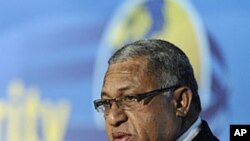New laws introduced by Fiji's military government have been criticized as more repressive than the emergency measures they replaced. It is almost a week since the authorities in the capital, Suva, lifted draconian powers that banned public meetings and muzzled the media. The military seized power in a bloodless coup in the South Pacific nation in December 2006.
A few days ago, Fiji’s army-led government lifted martial law, a move that ended emergency regulations that imposed media censorship and gave the security forces additional powers.
In a nationwide address, military leader and Prime Minister Commodore Frank Bainimarama promised that Fiji will embark on a road towards true democracy after more than five years of military rule.
However, opposition groups say the army has simply replaced martial law with even more repressive measures. They argue that the new Public Order Amendment Decree will severely limit rights and freedoms because it gives Fiji’s security forces the power to use weapons to break up meetings and allows individuals to be held for weeks without access to the courts.
The head of the Citizens Constitutional Forum in Fiji, Akuila Yabaki, is worried that soldiers will have too much power. “They would now be able to arrest civilians and conduct the duties of a police officer and prison officers, if so directed by the commissioner of police, who is himself a highly placed military officer. He's a brigadier," he said.
Fiji’s military leaders have not tolerated dissent since they deposed an elected government more than five years ago. They scrapped the constitution when a court ruled their coup was illegal and the army brought in martial law in 2009.
Von Driu, a spokesman for the Fiji Democracy and Freedom Movement, says the new decree will smother any effective opposition to the military authorities. “People who will talk in opposition with the current regime, they are being silenced," he said.
Fiji’s government says the new decree will boost national security and will give citizens the right to express their opinions.
In an interview Thursday with Radio Fiji, Attorney General Aiyaz Sayed-Khaiyum argued that the provisions in the decree are less onerous than those that exist in many other countries, including Australia.
He said that under the decree, certain police powers, such as the right to close roads, are spelled out and made transparent for the first time.
Commodore Bainimarama has promised to cleanse Fiji of political corruption and end racism towards the country’s Indo-Fijian minority. Critics, though, say the Commodore is a power-hungry dictator who will never release his grip on the South Pacific island nation.
Since the December 2006 coup, Fiji has been suspended from the Pacific Islands Forum, a major political bloc, and by the Commonwealth, a grouping of former British colonies.
Fiji is the political and economic hub of the South Pacific. The tropical archipelago has a population of about 900,000 people and lies between Hawaii and New Zealand.








